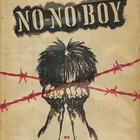A positive attitude and a good heart
In the fourth chapter, following the introduction of Kenji, a friend of the protagonist Ichiro who lost a leg in battle, the author introduces a striking woman, Emi, who is also Japanese, young and attractive, but also carries emotional scars.
Emi is married to Ralph, who is also of Japanese descent, but even after the war ended, her husband Ralph refused to return to America, serving in the military in Europe, because he felt ashamed of his older brother Mike, for the same reason that Ichiro's younger brother Taro felt ashamed of his brother's actions in turning his back on America.
Mike had lived as an American citizen, having served in the U.S. Army during World War I. However, after the outbreak of war between Japan and the U.S., he became enraged at the way the U.S. government treated people of Japanese descent, and he suddenly took an anti-American stance, was put in an internment camp, and eventually ended up in Japan, where he had no familiarity whatsoever.
Similarly, Emi's father, who was in the United States, also requested deportation and went to Japan. Like Ichiro's mother, he believed that Japan could never lose. However, in reality, he regretted going to Japan and wanted to live in the United States.
Emi, whose mother passed away before the war, was lonely. Nevertheless, she cared about her friend Kenji, and when she met Ichiro through Kenji, she thought about his problems as if they were her own, and encouraged him. In this respect, it seems that the author is portraying Emi as a positive person, expressing the author's own thoughts.
Will there ever be forgiveness?
Let's follow the flow of the fourth chapter. Ichiro and Kenji reunite and go together to a bar where Japanese people gather to gamble. There, they meet Bull, a Japanese veteran, and are treated badly. They also hear people mocking No-No Boy.
Seattle King Street in the novel
Ichiro, who already has problems, continues to drink and gets drunk. Then his younger brother Taro appears and asks him to let him see him. When Ichiro goes outside, he is attacked by a young Japanese man who is Taro's friend. Ichiro is saved by Kenji, but at the same time, he cannot forgive Taro and once again questions him about the crimes he committed during the war.
"You were just luckier than I was. You were too young to carry a gun during the war. You were just as lucky as the thousands of others who, because of age, ill health, money, or connections, were spared the draft. If you had been drafted, you might have answered the same way I did.
(Omitted)
I am innocent. But you blame me. I hate you for it, and I will hate you even more when I see you go into the military and then come out and walk the streets of America, always and forever like you own the place. I made a mistake. I know it because the pain in my heart is so great. I have suffered because of it, and I will suffer more from it. And on top of all the pain and regret, you won't even give me a chance to start over?..."
Ichiro believes he made a mistake. That's why he served time in prison. But he wonders why he can't be sure he's the same as other Americans. He asks himself what other price he has to pay.
Forgive your country with a big heart
After leaving the bar, Kenji takes Ichiro to the house of Emi, who lives alone in the suburbs. The two hit it off when they first met, and Emi, who likes Ichiro, who she no longer has contact with, ends up spending the night with him thanks to Kenji's mysterious arrangement.
Emi, who was informed of Ichiro's situation, desperately tries to encourage Ichiro, who continues to blame himself and retreat into his shell, to get back on his feet. While Ichiro's troubled words are complex, the words the author has Emi speak are very straightforward. They express trust in the country of America and a warm understanding.
"...This is a big country with a big heart. There's a place for all kinds of people here. Maybe what you've done doesn't put you among the good people, but you're not among the worst either."
"... In any other country, you would have been shot for what you did. But not this country. Your country was wrong when it doubted you. Your country made you do what you did. It was wrong of your country. So your country admitted it was wrong and set you free. Try if you can. Be as big as your country, forgive it, be grateful, and prove that you can be an American worth not only for its strengths but also its weaknesses."
Emi then invites Ichiro to imagine the excitement of singing the American national anthem.
"...And then you'll understand that the mistakes you made are not as big as the mistakes your country made."
The next morning, Ichiro and Kenji leave Emi's house and go to Portland. Kenji is to be admitted to a veterans hospital. Emi senses that Kenji's condition is not good and that this will be their last farewell. As they say goodbye, Kenji says to Emi, who has changed into a beautiful dress.
"Thank you, it's not black. It's beautiful."
Emi was crying as she watched the car leave.
(Translation by the author)
© 2016 Ryusuke Kawai






